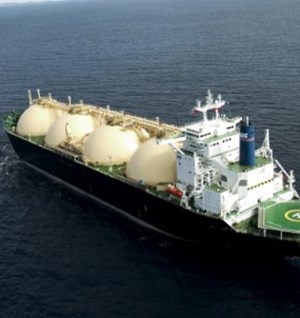Australia labor strikes could disrupt 10% of global LNG exports
(Bloomberg) – Potential strikes at three major liquefied natural gas (LNG) facilities in Australia could disrupt about 10% of global exports of the fuel and deliver a new energy price shock across Asia and Europe.
Workers at Chevron Corp. and Woodside Energy Group Ltd. facilities in Australia have voted to approve industrial action at the North West Shelf, Wheatstone and Gorgon operations, and some walkouts could begin as soon as next week under labor rules.
European natural gas fluctuated Thursday as traders weighed the prospects of any major impact and erased some of the 28% surge the previous day — a move not seen since the early weeks of the Russian invasion of Ukraine last year that upended global supply of the fuel.
Futures had briefly topped €40 a megawatt-hour Wednesday for the first time since June, though they are still down more than 80% from the unprecedented levels hit in August last year. The contract traded at €36.78 as of 9:25 a.m. in London.
“The situation highlights the importance of Australian LNG for global energy security, with even the possibility of a disruption to Australian gas supply causing large price spikes as far away as Europe,” said Saul Kavonic, a Sydney-based energy analyst at Credit Suisse Group AG. “But in all likelihood an accommodation will be reached before it presents a material impact on global LNG supply.”
The spike in natural gas prices in Europe, which rarely receives LNG from Australia, highlighted the region’s nervousness about supplies following last year’s crisis that saw flows drop from Russia, traditionally its biggest source of the heating and power plant fuel. Worries have persisted even with the continent’s gas storage levels currently at almost 90% and above the five-year average.
Strikes that disrupt exports from all of the Australian plants for two months — a similar duration as last year’s interruption at Shell Plc’s Prelude floating LNG production hub in Australia — could send prices to €50 for the rest of the northern hemisphere summer and as high as €97 in the winter, according to Goldman Sachs Group Inc. analyst Samantha Dart.
Workers are seeking improved benchmark pay and conditions, and steps to improve job security, including limits on the outsourcing of roles to labor hire contractors, the Offshore Alliance, which includes members of two key labor unions, said in a statement.
Action by staff could involve refusing to load tankers or vessels, or complete work stoppages, according to the alliance. Negotiations between workers and company officials continued Thursday and more talks are scheduled for Tuesday, the group said.
Following the vote of about 150 Woodside staff, industrial action at some of the producer’s sites off the coast of Western Australia could take place within a 30-day window, contingent on seven working days’ notice, the company said.
Australia’s LNG sector is forecast to generate export earnings of A$68 billion ($45 billion) in the year to June 30, according to the nation’s government. The disputes effectively mean a few hundred workers seeking wage increases are putting a multi-billion industry in jeopardy, according to Kavonic. “The asymmetry of the stakes is astonishing,” he said.
Shares in Australia’s biggest LNG producers rose Thursday, with Woodside advancing 1.9% in Sydney trading and smaller counterpart Santos Ltd. gaining 2.6%.
“Positive progress is being made and the parties have reached an in-principle agreement on a number of issues that are key to the workforce,” Perth-based Woodside said. Chevron continues “to engage our employees and their representatives as we seek outcomes that are in the interests of both employees and the company,” the supplier said in a statement.
Any squeeze on exports from Australia would stoke competition for cargoes between Asia and Europe — which has become more reliant on seaborne LNG as it shuns Russia’s gas exports. When coupled with rising winter consumption, that scenario could trigger price volatility in the final quarter of 2023, Bloomberg Intelligence analyst Will Hares said in a Thursday note.
“Where prices go from here will really depend on whether this strike action goes ahead, and if so, for how long,” said Warren Patterson, head of commodities strategy at ING Groep NV in Singapore. “A prolonged strike would see Asian buyers looking further afield for LNG supply, potentially seeing these buyers competing more aggressively with Europe for supply.”



